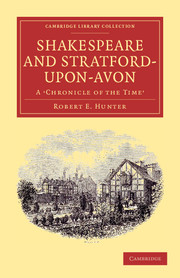Summary
The first jubilee in honour of Shakespeare, which took place at Stratford-upon-Avon, in 1769, is generally called “Garrick's.” He originated and carried out that much ridiculed—somewhat unfortunate—but, on the whole, successful and praiseworthy celebration. Garrick had been at that time no less than twenty-eight years on the stage, unprecedentedly successful as actor and manager. He was not a profound student of Shakespeare, nor had he unqualified reverence for his genius. In compliment to the greatest if not only detractor of Shakespeare in the literary world —Voltaire—he maimed “Hamlet” by cutting out the grave scene and “burking” Osric. The rapidity and intensity of his style enabled him to give a novel and spirited picture of Richard and his wonderful mimetic faculties account to me largely for the effects he created in Lear; but as a tragedian, in the strict sense of the term, he was almost as mentally dwarfed as he was physically stunted, however otherwise his biographers, the Irish dramatist and barrister, Murphy, or “the author,” as Johnson said, “engendered from the corruption of a bookseller,” Davies, may describe him. He had not the dignity of Quin, the power of Mossop, or the physical endowments of Barry. Certainly he was nowhere with Barry in Othello, and came up to him in only the banishment scene of Romeo. His Hamlet, I feel persuaded, was not equal to that of Betterton or Charles Mayne Young, or his Macbeth to that of William Charles Macready.
- Type
- Chapter
- Information
- Shakespeare and Stratford-upon-AvonA 'Chronicle of the Time', pp. 73 - 86Publisher: Cambridge University PressPrint publication year: 2009First published in: 1864

